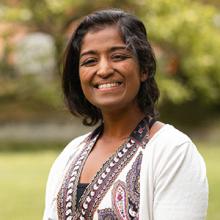
Photo courtesy of Ms. Jain
Did you know that NINDS trainees can help plan a symposium at NIH? Graduate student Poorva Jain recently served on the planning committee for the 19th Annual NIH Graduate Student Research Symposium, held February 15-16.
Poorva is an M.D.-Ph.D. student in the NIH Oxford-Cambridge Scholars Program. She is conducting research in the laboratory of Irene Cortese, M.D., assistant clinical investigator in the Experimental Immunotherapeutics Unit. For her graduate work, Poorva studies the molecular underpinnings of progressive multifocal leukoencephalopathy (PML), a severe demyelinating disease of the central nervous system caused by the JC virus.
Shortly after joining the lab in the fall of 2022, Poorva received an email from the NIH Office of Intramural Training and Education advertising the opportunity to help plan the annual symposium for graduate student researchers at NIH. Excited to help with the greater graduate student community efforts on campus, she volunteered to serve on the Graduate Research Symposium Committee.
To learn about this exciting opportunity, we asked Poorva a few questions about her experience as a committee member. Want to know more? See her answers below!
What were your responsibilities on the committee?
The Graduate Student Research Symposium, which is open to all NIH graduate students, was conducted in a hybrid (in-person and virtual) format this year. The symposium included oral presentations, a poster session, and an elevator pitch competition. My role was to help select the oral presentation speakers.
Specifically, I read half of the submitted abstracts and selected which abstracts would be considered for an oral presentation. We identified speakers based on the quality of experiments, how the research impact was communicated, and the overall abstract presentation. We were also careful to consider diverse representation in our speaker line up. The final speaker selections were made following a group discussion and majority vote.
After we selected the speakers, I provided feedback at a practice run for the oral presentation session.
The time commitment was quite flexible, and committee members could be involved as much as they would like alongside their lab experiments. For example, I was supposed to run the elevator pitch segment, but a last-minute experiment meant that I was unable to participate in that part.
What did you learn that was most helpful for your career development?
I love science, and I am invested in identifying ways in which we can make science accessible to a greater audience. It may sound cliché, but this experience reiterated to me how challenging it can be to make relatively niche research interesting and approachable to bigger audiences. I enjoyed reading the abstracts and listening to practice presentations to provide my feedback.
What is your most memorable experience from serving on the committee?
My most memorable experience was selecting the speakers for oral presentations. It was a long meeting, and there was a lot of debate on the different abstracts. We had many high-quality abstract submissions, and it was quite challenging to select only eight as speakers.
Any advice for NINDS graduate students who are considering serving on a committee?
I recommend that students should get involved when they can, because they can help shape events to their liking. Students may be concerned that NIH doesn’t have the traditional graduate school landscape that many other institutions have. I think that’s something that we as students can absolutely create for ourselves, but it requires students to get involved to identify and voice what they would like to see.
Why did you choose the NINDS graduate partnership program for your graduate work?
I felt that a collaboration between two institutes, as part of the OxCam Scholars Program, would enhance the quality of science that I could put forward. I also thought it would help me to develop professional skills like teamwork, leadership, and project design.
I chose NINDS, specifically, to work with Dr. Irene Cortese. I have always been interested in neuroscience, and I was intrigued by the opportunity to investigate neuroimmune and adaptive immune responses over the course of a disease process.
Contributed by Shana R. Spindler, Ph.D., freelance science writer and former NIH postdoctoral fellow.
